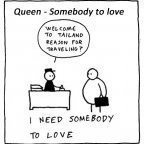Survey - Electrical Service In Isaan
-
Recently Browsing 0 members
- No registered users viewing this page.
-
Topics
-
-
Popular Contributors
-
-
Latest posts...
-
31
Re-entry permit: what's the logic behind it?
No. You would need to kill off Non O status in order to apply for DTV which is a "special" Tourist Visa category. You cannot change the reason (basis) -
178
The face of Dem lunatics …
They're just raging. Never seen a person lose their s**t daily, firing of volleys of mouth-frothing drivel. I have a theory they do this whenever mum/dad/nurse turns their attention away for a few minutes.😄 Absolutely mental. -
253
Border Thai and Cambodian Troops Clash Near Ta Muen Thom Temple
Left home with the wife to an agreed rendez-vous place where the rest of the family is taking refuge. As we were driving, we crossed a long line of APC with some stationed at nearby schools. -
31
-
92
Traffic Pattaya Introduces Smart Crossings for Enhanced Safety
A Pattaya 'Smart" crossing' an oxymoron (more chance of one of those crossing) if ever if I have heard one certainly wouldn't happen at night time! -
228
2025 SSA Form 7162 - "Hello, are you dead yet?" forms.
The form I see to download has section 1 (which I assume you leave blank) and I would assume you simply write in your telephone number in section 2. There is a big gap before section 3. There is ample room to put all info from a previous official version here, including the various number strings. I haven't done it but, but this is something I'll consider in a week or so if the real ones don't arrive. I was also thinking about the difference between faxing it or mailing it... any thoughts?
-
-
Popular in The Pub












Recommended Posts
Create an account or sign in to comment
You need to be a member in order to leave a comment
Create an account
Sign up for a new account in our community. It's easy!
Register a new accountSign in
Already have an account? Sign in here.
Sign In Now